Entrepreneurship & Innovation: A Study
VerifiedAdded on 2020/01/07
|13
|4061
|155
Literature Review
AI Summary
This assignment delves into the multifaceted world of entrepreneurship and innovation. It examines various psychological aspects influencing entrepreneurial behavior, explores different innovation strategies employed by businesses, and analyzes real-world examples of successful wineries navigating complex market landscapes. The provided research papers and publications offer insights into the theoretical frameworks, empirical findings, and practical implications surrounding entrepreneurship and innovation.
Contribute Materials
Your contribution can guide someone’s learning journey. Share your
documents today.
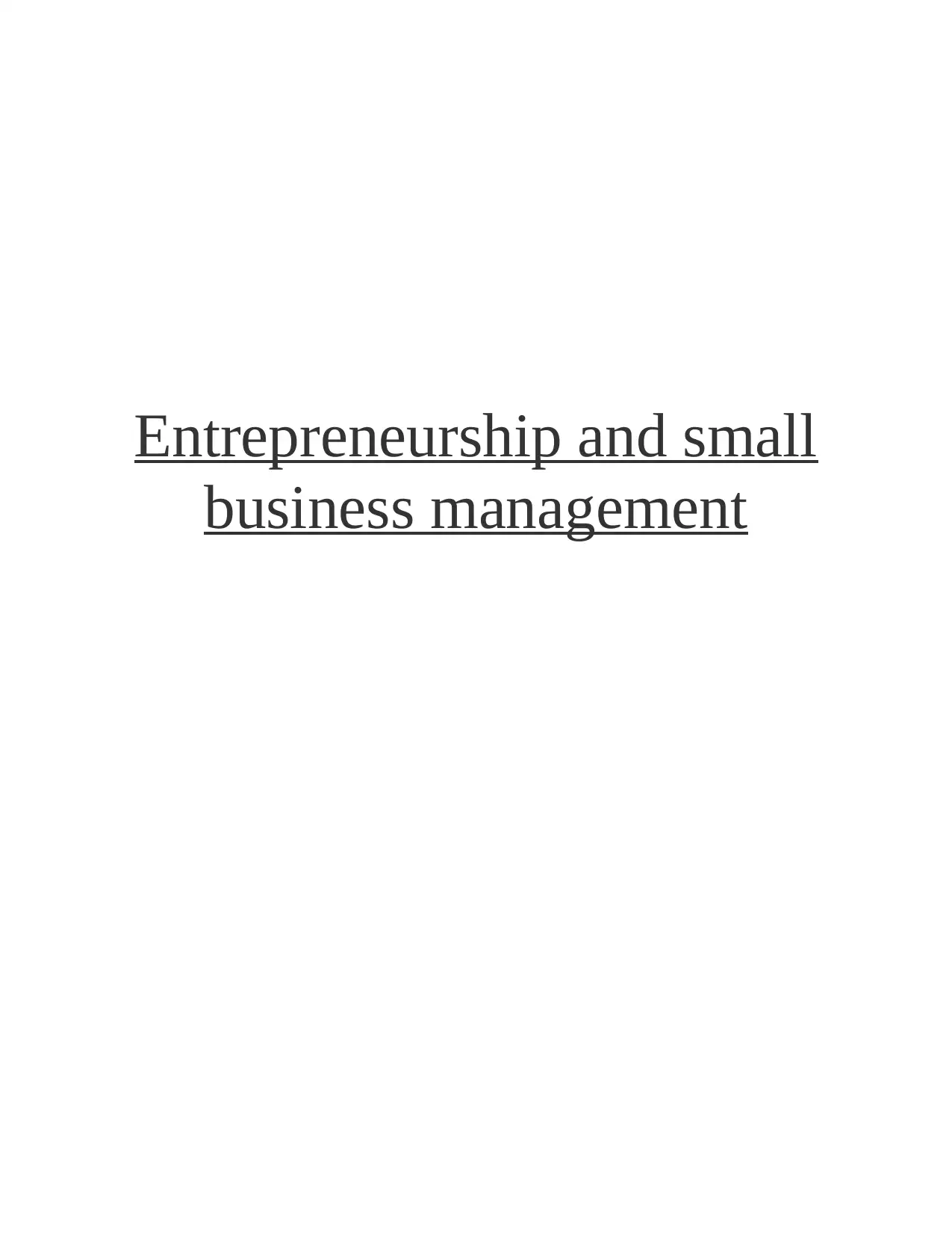
Entrepreneurship and small
business management
business management
Secure Best Marks with AI Grader
Need help grading? Try our AI Grader for instant feedback on your assignments.

TABLE OF CONTENTS
INTRODUCTION ..........................................................................................................................3
TASK 1............................................................................................................................................3
P1 Types of entrepreneurship venture and their relation to typology .........................................3
P2 similarities and differences between entrepreneurial ventures...............................................4
P3 impact o small business micro business on economy ............................................................5
P4) importance of small-business and Startups on the growth of social economy .....................6
PART 2............................................................................................................................................8
P5 Characteristics, traits and skills of successful entrepreneurs..................................................8
P6 Aspects of the entrepreneurial personality reflect entrepreneurial motivation and mindsets9
P7 Impact of person’s background and experiences can hinder or foster entrepreneurship.....10
CONCLUSION .............................................................................................................................11
REFERENCES..............................................................................................................................12
INTRODUCTION ..........................................................................................................................3
TASK 1............................................................................................................................................3
P1 Types of entrepreneurship venture and their relation to typology .........................................3
P2 similarities and differences between entrepreneurial ventures...............................................4
P3 impact o small business micro business on economy ............................................................5
P4) importance of small-business and Startups on the growth of social economy .....................6
PART 2............................................................................................................................................8
P5 Characteristics, traits and skills of successful entrepreneurs..................................................8
P6 Aspects of the entrepreneurial personality reflect entrepreneurial motivation and mindsets9
P7 Impact of person’s background and experiences can hinder or foster entrepreneurship.....10
CONCLUSION .............................................................................................................................11
REFERENCES..............................................................................................................................12
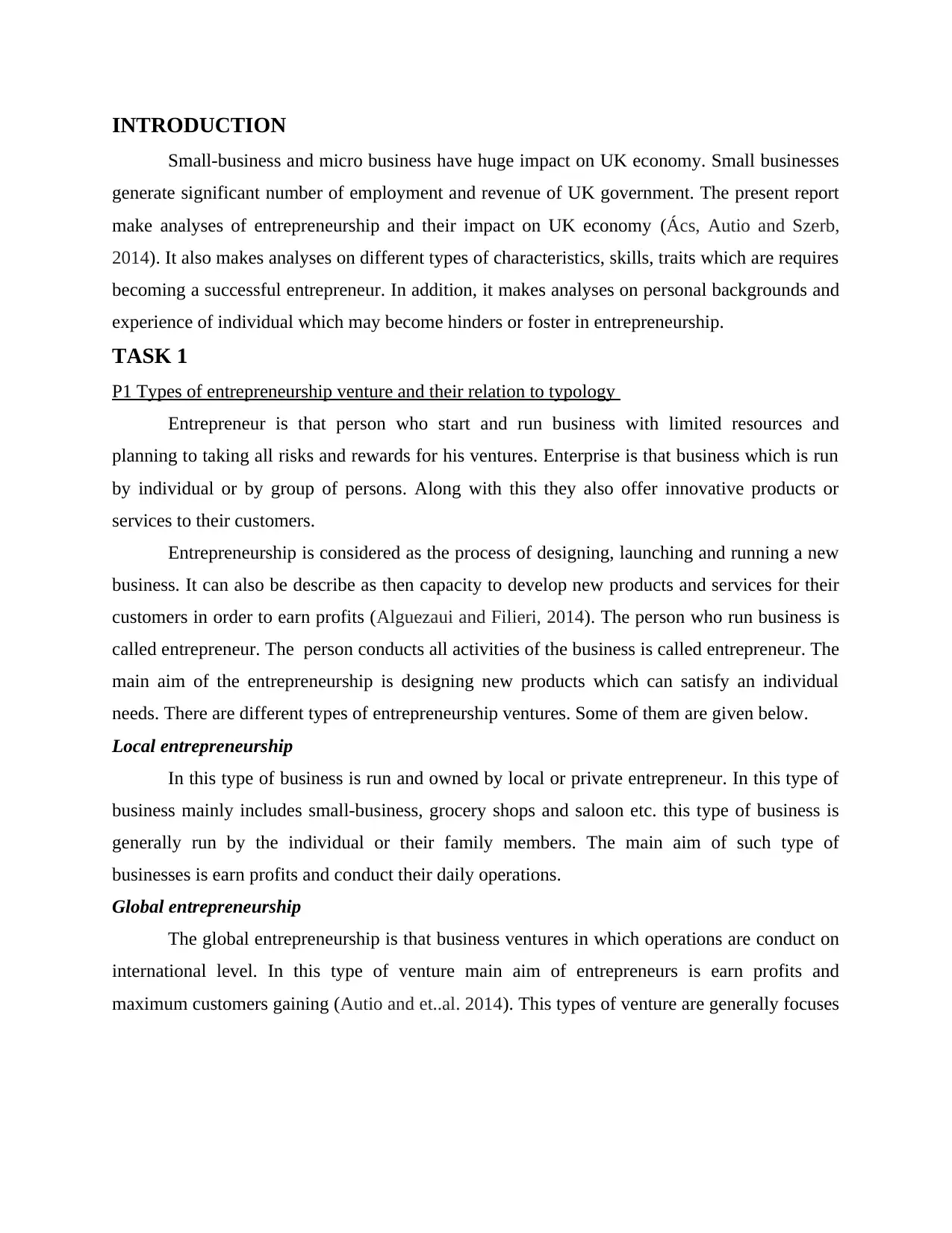
INTRODUCTION
Small-business and micro business have huge impact on UK economy. Small businesses
generate significant number of employment and revenue of UK government. The present report
make analyses of entrepreneurship and their impact on UK economy (Ács, Autio and Szerb,
2014). It also makes analyses on different types of characteristics, skills, traits which are requires
becoming a successful entrepreneur. In addition, it makes analyses on personal backgrounds and
experience of individual which may become hinders or foster in entrepreneurship.
TASK 1
P1 Types of entrepreneurship venture and their relation to typology
Entrepreneur is that person who start and run business with limited resources and
planning to taking all risks and rewards for his ventures. Enterprise is that business which is run
by individual or by group of persons. Along with this they also offer innovative products or
services to their customers.
Entrepreneurship is considered as the process of designing, launching and running a new
business. It can also be describe as then capacity to develop new products and services for their
customers in order to earn profits (Alguezaui and Filieri, 2014). The person who run business is
called entrepreneur. The person conducts all activities of the business is called entrepreneur. The
main aim of the entrepreneurship is designing new products which can satisfy an individual
needs. There are different types of entrepreneurship ventures. Some of them are given below.
Local entrepreneurship
In this type of business is run and owned by local or private entrepreneur. In this type of
business mainly includes small-business, grocery shops and saloon etc. this type of business is
generally run by the individual or their family members. The main aim of such type of
businesses is earn profits and conduct their daily operations.
Global entrepreneurship
The global entrepreneurship is that business ventures in which operations are conduct on
international level. In this type of venture main aim of entrepreneurs is earn profits and
maximum customers gaining (Autio and et..al. 2014). This types of venture are generally focuses
Small-business and micro business have huge impact on UK economy. Small businesses
generate significant number of employment and revenue of UK government. The present report
make analyses of entrepreneurship and their impact on UK economy (Ács, Autio and Szerb,
2014). It also makes analyses on different types of characteristics, skills, traits which are requires
becoming a successful entrepreneur. In addition, it makes analyses on personal backgrounds and
experience of individual which may become hinders or foster in entrepreneurship.
TASK 1
P1 Types of entrepreneurship venture and their relation to typology
Entrepreneur is that person who start and run business with limited resources and
planning to taking all risks and rewards for his ventures. Enterprise is that business which is run
by individual or by group of persons. Along with this they also offer innovative products or
services to their customers.
Entrepreneurship is considered as the process of designing, launching and running a new
business. It can also be describe as then capacity to develop new products and services for their
customers in order to earn profits (Alguezaui and Filieri, 2014). The person who run business is
called entrepreneur. The person conducts all activities of the business is called entrepreneur. The
main aim of the entrepreneurship is designing new products which can satisfy an individual
needs. There are different types of entrepreneurship ventures. Some of them are given below.
Local entrepreneurship
In this type of business is run and owned by local or private entrepreneur. In this type of
business mainly includes small-business, grocery shops and saloon etc. this type of business is
generally run by the individual or their family members. The main aim of such type of
businesses is earn profits and conduct their daily operations.
Global entrepreneurship
The global entrepreneurship is that business ventures in which operations are conduct on
international level. In this type of venture main aim of entrepreneurs is earn profits and
maximum customers gaining (Autio and et..al. 2014). This types of venture are generally focuses
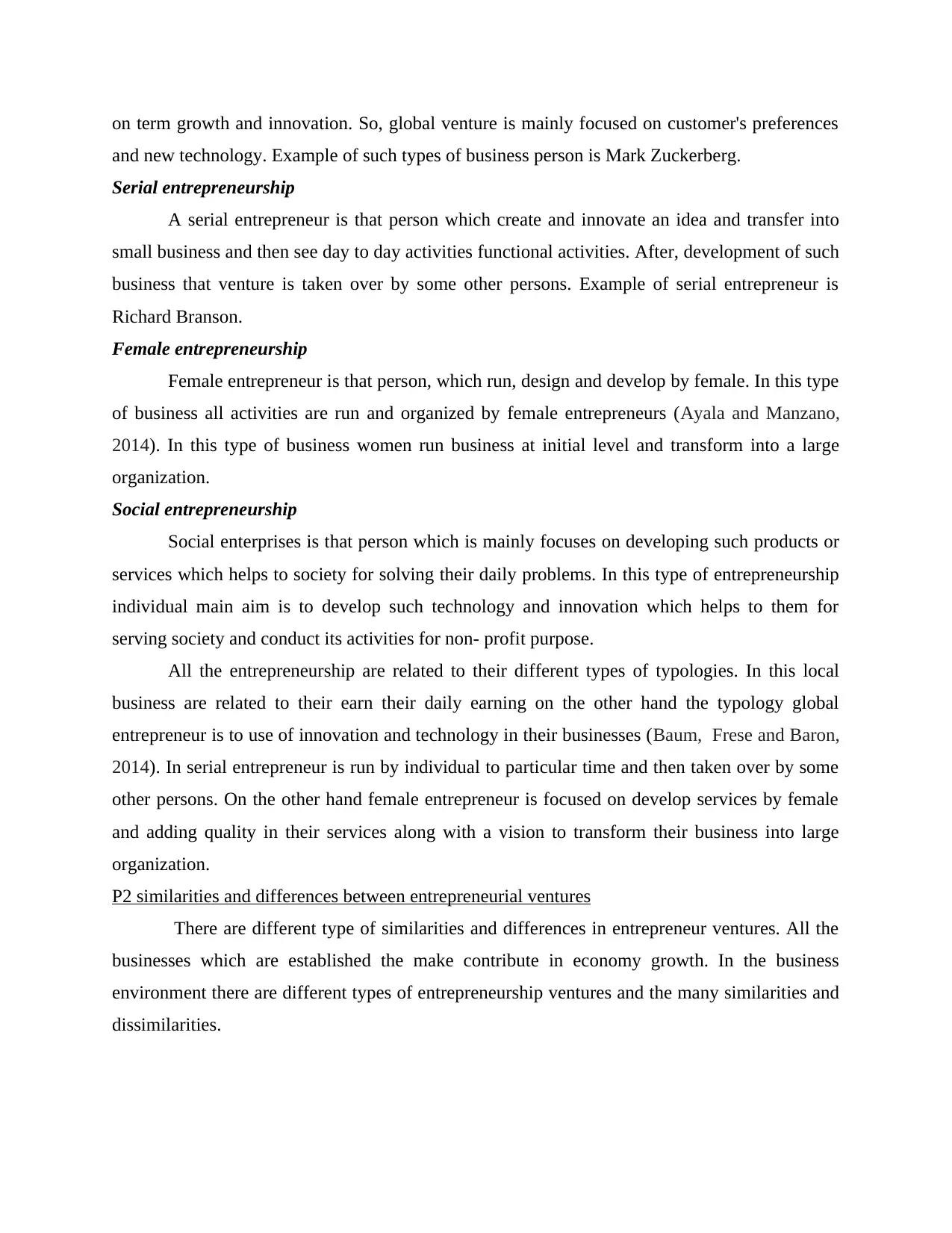
on term growth and innovation. So, global venture is mainly focused on customer's preferences
and new technology. Example of such types of business person is Mark Zuckerberg.
Serial entrepreneurship
A serial entrepreneur is that person which create and innovate an idea and transfer into
small business and then see day to day activities functional activities. After, development of such
business that venture is taken over by some other persons. Example of serial entrepreneur is
Richard Branson.
Female entrepreneurship
Female entrepreneur is that person, which run, design and develop by female. In this type
of business all activities are run and organized by female entrepreneurs (Ayala and Manzano,
2014). In this type of business women run business at initial level and transform into a large
organization.
Social entrepreneurship
Social enterprises is that person which is mainly focuses on developing such products or
services which helps to society for solving their daily problems. In this type of entrepreneurship
individual main aim is to develop such technology and innovation which helps to them for
serving society and conduct its activities for non- profit purpose.
All the entrepreneurship are related to their different types of typologies. In this local
business are related to their earn their daily earning on the other hand the typology global
entrepreneur is to use of innovation and technology in their businesses (Baum, Frese and Baron,
2014). In serial entrepreneur is run by individual to particular time and then taken over by some
other persons. On the other hand female entrepreneur is focused on develop services by female
and adding quality in their services along with a vision to transform their business into large
organization.
P2 similarities and differences between entrepreneurial ventures
There are different type of similarities and differences in entrepreneur ventures. All the
businesses which are established the make contribute in economy growth. In the business
environment there are different types of entrepreneurship ventures and the many similarities and
dissimilarities.
and new technology. Example of such types of business person is Mark Zuckerberg.
Serial entrepreneurship
A serial entrepreneur is that person which create and innovate an idea and transfer into
small business and then see day to day activities functional activities. After, development of such
business that venture is taken over by some other persons. Example of serial entrepreneur is
Richard Branson.
Female entrepreneurship
Female entrepreneur is that person, which run, design and develop by female. In this type
of business all activities are run and organized by female entrepreneurs (Ayala and Manzano,
2014). In this type of business women run business at initial level and transform into a large
organization.
Social entrepreneurship
Social enterprises is that person which is mainly focuses on developing such products or
services which helps to society for solving their daily problems. In this type of entrepreneurship
individual main aim is to develop such technology and innovation which helps to them for
serving society and conduct its activities for non- profit purpose.
All the entrepreneurship are related to their different types of typologies. In this local
business are related to their earn their daily earning on the other hand the typology global
entrepreneur is to use of innovation and technology in their businesses (Baum, Frese and Baron,
2014). In serial entrepreneur is run by individual to particular time and then taken over by some
other persons. On the other hand female entrepreneur is focused on develop services by female
and adding quality in their services along with a vision to transform their business into large
organization.
P2 similarities and differences between entrepreneurial ventures
There are different type of similarities and differences in entrepreneur ventures. All the
businesses which are established the make contribute in economy growth. In the business
environment there are different types of entrepreneurship ventures and the many similarities and
dissimilarities.
Secure Best Marks with AI Grader
Need help grading? Try our AI Grader for instant feedback on your assignments.
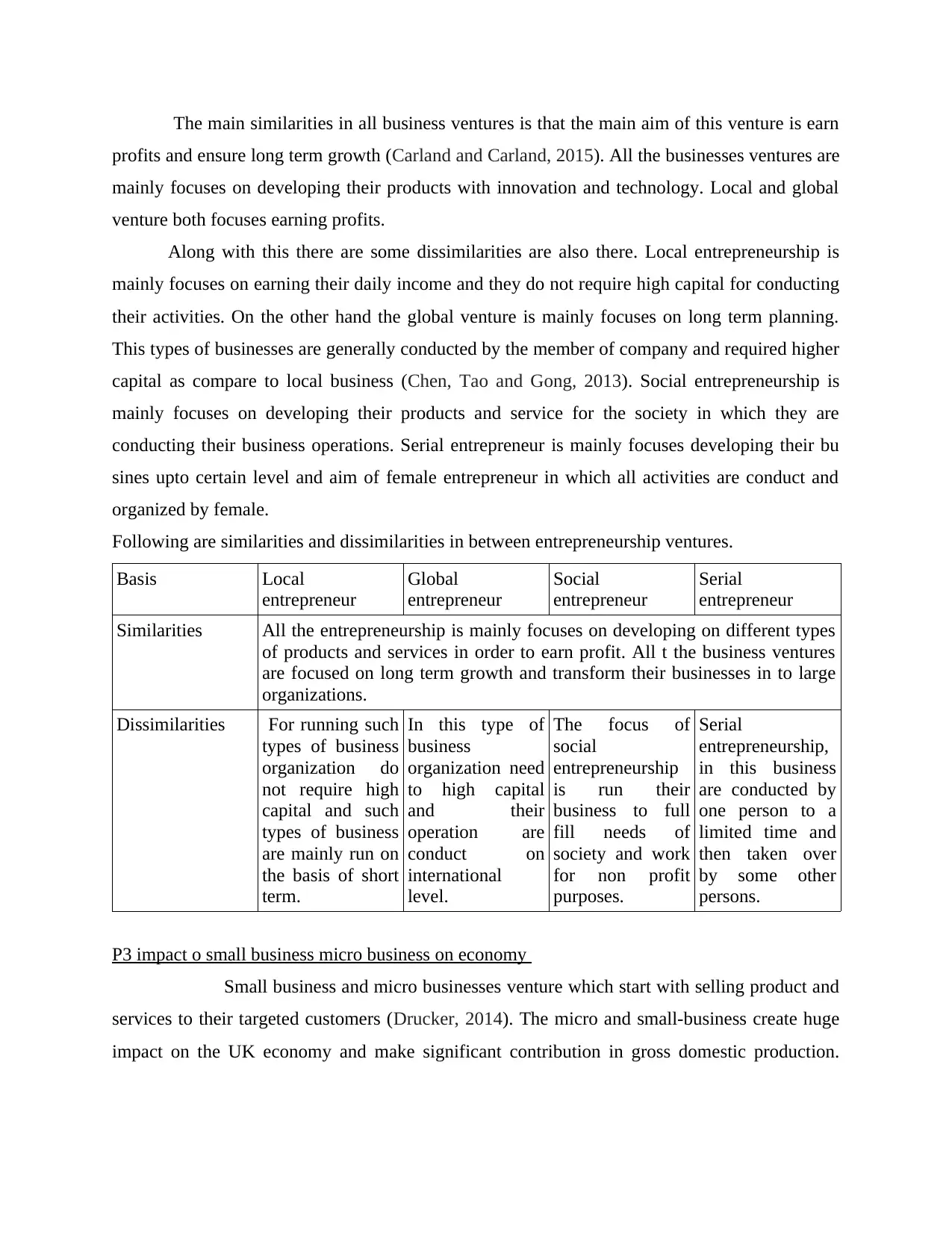
The main similarities in all business ventures is that the main aim of this venture is earn
profits and ensure long term growth (Carland and Carland, 2015). All the businesses ventures are
mainly focuses on developing their products with innovation and technology. Local and global
venture both focuses earning profits.
Along with this there are some dissimilarities are also there. Local entrepreneurship is
mainly focuses on earning their daily income and they do not require high capital for conducting
their activities. On the other hand the global venture is mainly focuses on long term planning.
This types of businesses are generally conducted by the member of company and required higher
capital as compare to local business (Chen, Tao and Gong, 2013). Social entrepreneurship is
mainly focuses on developing their products and service for the society in which they are
conducting their business operations. Serial entrepreneur is mainly focuses developing their bu
sines upto certain level and aim of female entrepreneur in which all activities are conduct and
organized by female.
Following are similarities and dissimilarities in between entrepreneurship ventures.
Basis Local
entrepreneur
Global
entrepreneur
Social
entrepreneur
Serial
entrepreneur
Similarities All the entrepreneurship is mainly focuses on developing on different types
of products and services in order to earn profit. All t the business ventures
are focused on long term growth and transform their businesses in to large
organizations.
Dissimilarities For running such
types of business
organization do
not require high
capital and such
types of business
are mainly run on
the basis of short
term.
In this type of
business
organization need
to high capital
and their
operation are
conduct on
international
level.
The focus of
social
entrepreneurship
is run their
business to full
fill needs of
society and work
for non profit
purposes.
Serial
entrepreneurship,
in this business
are conducted by
one person to a
limited time and
then taken over
by some other
persons.
P3 impact o small business micro business on economy
Small business and micro businesses venture which start with selling product and
services to their targeted customers (Drucker, 2014). The micro and small-business create huge
impact on the UK economy and make significant contribution in gross domestic production.
profits and ensure long term growth (Carland and Carland, 2015). All the businesses ventures are
mainly focuses on developing their products with innovation and technology. Local and global
venture both focuses earning profits.
Along with this there are some dissimilarities are also there. Local entrepreneurship is
mainly focuses on earning their daily income and they do not require high capital for conducting
their activities. On the other hand the global venture is mainly focuses on long term planning.
This types of businesses are generally conducted by the member of company and required higher
capital as compare to local business (Chen, Tao and Gong, 2013). Social entrepreneurship is
mainly focuses on developing their products and service for the society in which they are
conducting their business operations. Serial entrepreneur is mainly focuses developing their bu
sines upto certain level and aim of female entrepreneur in which all activities are conduct and
organized by female.
Following are similarities and dissimilarities in between entrepreneurship ventures.
Basis Local
entrepreneur
Global
entrepreneur
Social
entrepreneur
Serial
entrepreneur
Similarities All the entrepreneurship is mainly focuses on developing on different types
of products and services in order to earn profit. All t the business ventures
are focused on long term growth and transform their businesses in to large
organizations.
Dissimilarities For running such
types of business
organization do
not require high
capital and such
types of business
are mainly run on
the basis of short
term.
In this type of
business
organization need
to high capital
and their
operation are
conduct on
international
level.
The focus of
social
entrepreneurship
is run their
business to full
fill needs of
society and work
for non profit
purposes.
Serial
entrepreneurship,
in this business
are conducted by
one person to a
limited time and
then taken over
by some other
persons.
P3 impact o small business micro business on economy
Small business and micro businesses venture which start with selling product and
services to their targeted customers (Drucker, 2014). The micro and small-business create huge
impact on the UK economy and make significant contribution in gross domestic production.
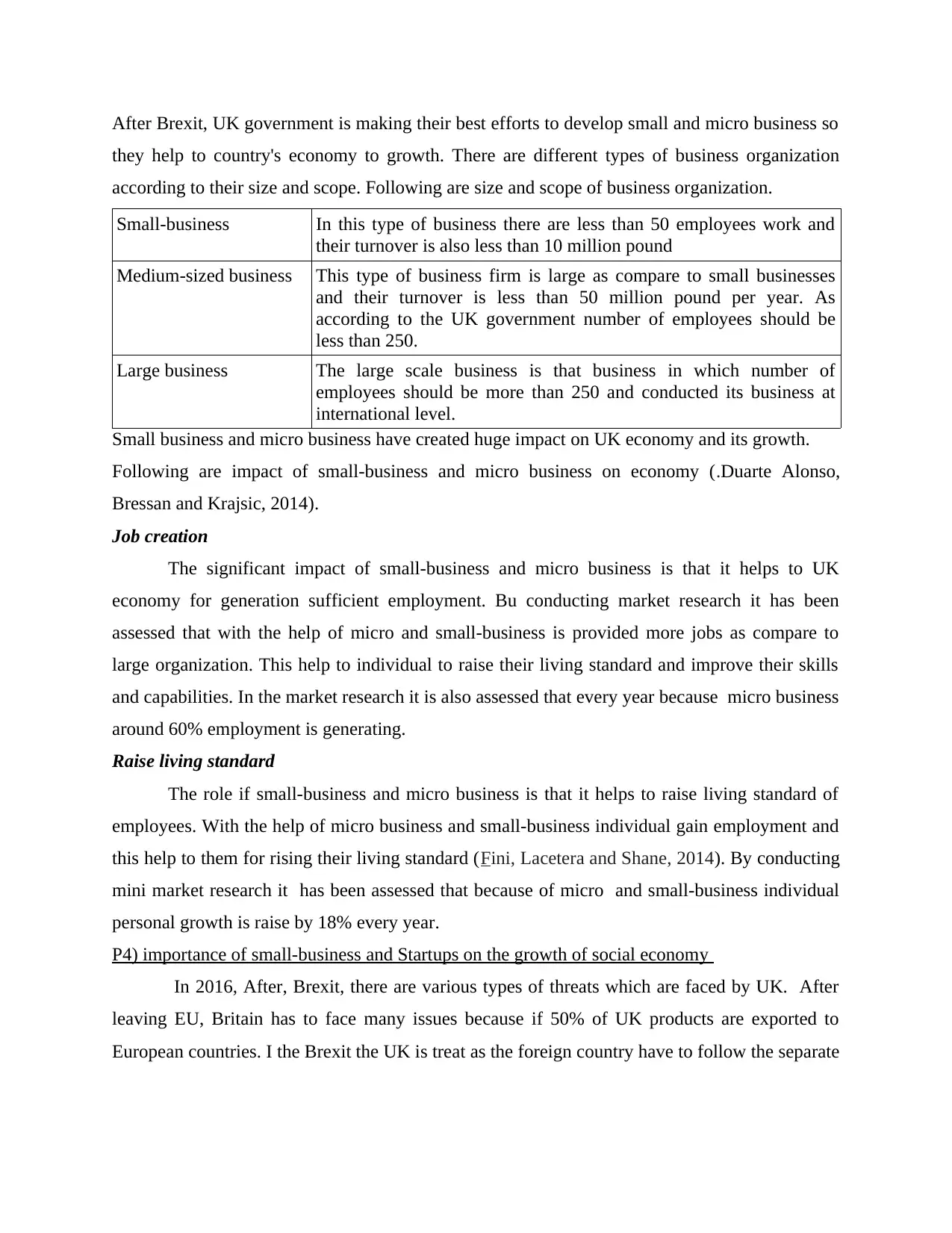
After Brexit, UK government is making their best efforts to develop small and micro business so
they help to country's economy to growth. There are different types of business organization
according to their size and scope. Following are size and scope of business organization.
Small-business In this type of business there are less than 50 employees work and
their turnover is also less than 10 million pound
Medium-sized business This type of business firm is large as compare to small businesses
and their turnover is less than 50 million pound per year. As
according to the UK government number of employees should be
less than 250.
Large business The large scale business is that business in which number of
employees should be more than 250 and conducted its business at
international level.
Small business and micro business have created huge impact on UK economy and its growth.
Following are impact of small-business and micro business on economy (.Duarte Alonso,
Bressan and Krajsic, 2014).
Job creation
The significant impact of small-business and micro business is that it helps to UK
economy for generation sufficient employment. Bu conducting market research it has been
assessed that with the help of micro and small-business is provided more jobs as compare to
large organization. This help to individual to raise their living standard and improve their skills
and capabilities. In the market research it is also assessed that every year because micro business
around 60% employment is generating.
Raise living standard
The role if small-business and micro business is that it helps to raise living standard of
employees. With the help of micro business and small-business individual gain employment and
this help to them for rising their living standard (Fini, Lacetera and Shane, 2014). By conducting
mini market research it has been assessed that because of micro and small-business individual
personal growth is raise by 18% every year.
P4) importance of small-business and Startups on the growth of social economy
In 2016, After, Brexit, there are various types of threats which are faced by UK. After
leaving EU, Britain has to face many issues because if 50% of UK products are exported to
European countries. I the Brexit the UK is treat as the foreign country have to follow the separate
they help to country's economy to growth. There are different types of business organization
according to their size and scope. Following are size and scope of business organization.
Small-business In this type of business there are less than 50 employees work and
their turnover is also less than 10 million pound
Medium-sized business This type of business firm is large as compare to small businesses
and their turnover is less than 50 million pound per year. As
according to the UK government number of employees should be
less than 250.
Large business The large scale business is that business in which number of
employees should be more than 250 and conducted its business at
international level.
Small business and micro business have created huge impact on UK economy and its growth.
Following are impact of small-business and micro business on economy (.Duarte Alonso,
Bressan and Krajsic, 2014).
Job creation
The significant impact of small-business and micro business is that it helps to UK
economy for generation sufficient employment. Bu conducting market research it has been
assessed that with the help of micro and small-business is provided more jobs as compare to
large organization. This help to individual to raise their living standard and improve their skills
and capabilities. In the market research it is also assessed that every year because micro business
around 60% employment is generating.
Raise living standard
The role if small-business and micro business is that it helps to raise living standard of
employees. With the help of micro business and small-business individual gain employment and
this help to them for rising their living standard (Fini, Lacetera and Shane, 2014). By conducting
mini market research it has been assessed that because of micro and small-business individual
personal growth is raise by 18% every year.
P4) importance of small-business and Startups on the growth of social economy
In 2016, After, Brexit, there are various types of threats which are faced by UK. After
leaving EU, Britain has to face many issues because if 50% of UK products are exported to
European countries. I the Brexit the UK is treat as the foreign country have to follow the separate
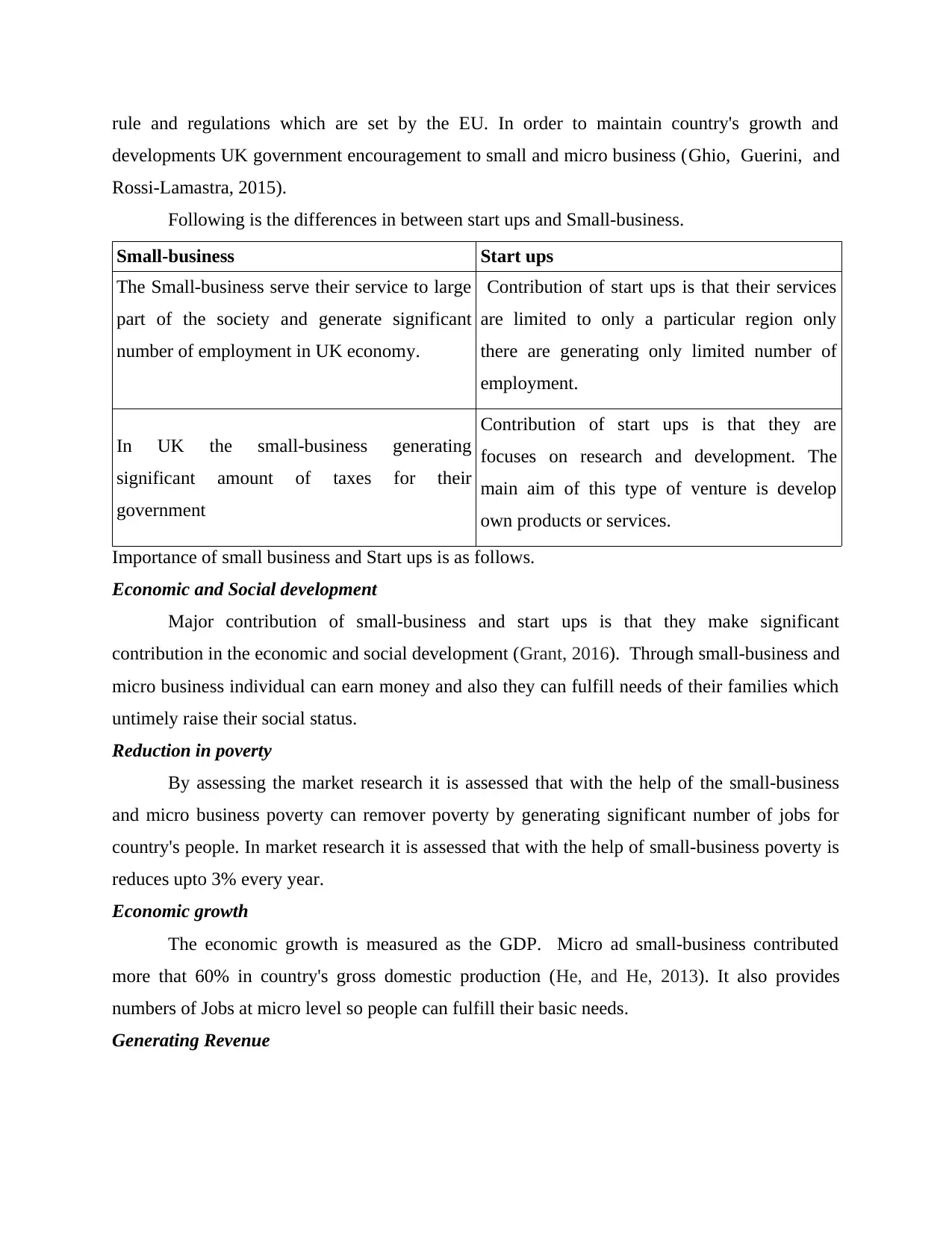
rule and regulations which are set by the EU. In order to maintain country's growth and
developments UK government encouragement to small and micro business (Ghio, Guerini, and
Rossi-Lamastra, 2015).
Following is the differences in between start ups and Small-business.
Small-business Start ups
The Small-business serve their service to large
part of the society and generate significant
number of employment in UK economy.
Contribution of start ups is that their services
are limited to only a particular region only
there are generating only limited number of
employment.
In UK the small-business generating
significant amount of taxes for their
government
Contribution of start ups is that they are
focuses on research and development. The
main aim of this type of venture is develop
own products or services.
Importance of small business and Start ups is as follows.
Economic and Social development
Major contribution of small-business and start ups is that they make significant
contribution in the economic and social development (Grant, 2016). Through small-business and
micro business individual can earn money and also they can fulfill needs of their families which
untimely raise their social status.
Reduction in poverty
By assessing the market research it is assessed that with the help of the small-business
and micro business poverty can remover poverty by generating significant number of jobs for
country's people. In market research it is assessed that with the help of small-business poverty is
reduces upto 3% every year.
Economic growth
The economic growth is measured as the GDP. Micro ad small-business contributed
more that 60% in country's gross domestic production (He, and He, 2013). It also provides
numbers of Jobs at micro level so people can fulfill their basic needs.
Generating Revenue
developments UK government encouragement to small and micro business (Ghio, Guerini, and
Rossi-Lamastra, 2015).
Following is the differences in between start ups and Small-business.
Small-business Start ups
The Small-business serve their service to large
part of the society and generate significant
number of employment in UK economy.
Contribution of start ups is that their services
are limited to only a particular region only
there are generating only limited number of
employment.
In UK the small-business generating
significant amount of taxes for their
government
Contribution of start ups is that they are
focuses on research and development. The
main aim of this type of venture is develop
own products or services.
Importance of small business and Start ups is as follows.
Economic and Social development
Major contribution of small-business and start ups is that they make significant
contribution in the economic and social development (Grant, 2016). Through small-business and
micro business individual can earn money and also they can fulfill needs of their families which
untimely raise their social status.
Reduction in poverty
By assessing the market research it is assessed that with the help of the small-business
and micro business poverty can remover poverty by generating significant number of jobs for
country's people. In market research it is assessed that with the help of small-business poverty is
reduces upto 3% every year.
Economic growth
The economic growth is measured as the GDP. Micro ad small-business contributed
more that 60% in country's gross domestic production (He, and He, 2013). It also provides
numbers of Jobs at micro level so people can fulfill their basic needs.
Generating Revenue
Paraphrase This Document
Need a fresh take? Get an instant paraphrase of this document with our AI Paraphraser
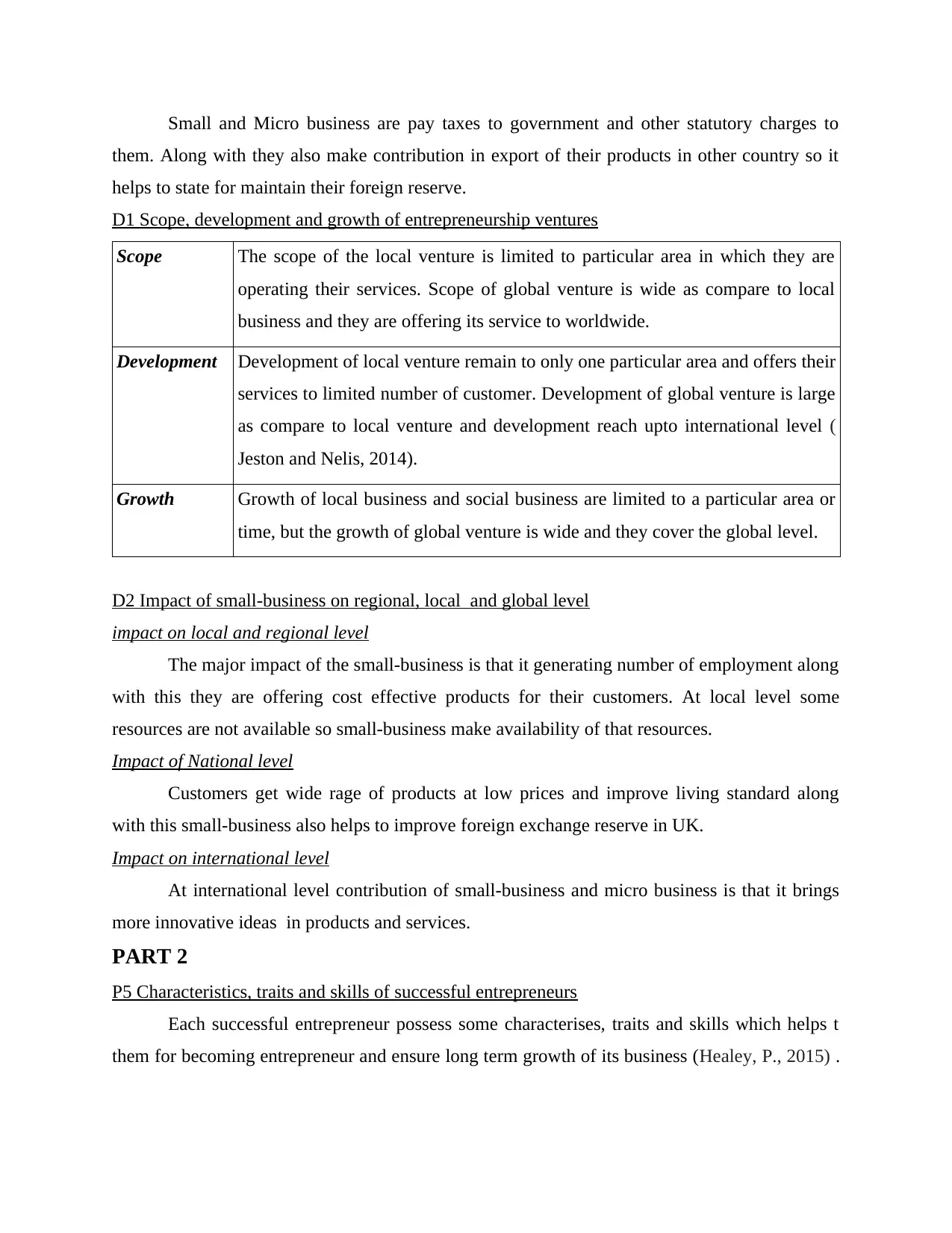
Small and Micro business are pay taxes to government and other statutory charges to
them. Along with they also make contribution in export of their products in other country so it
helps to state for maintain their foreign reserve.
D1 Scope, development and growth of entrepreneurship ventures
Scope The scope of the local venture is limited to particular area in which they are
operating their services. Scope of global venture is wide as compare to local
business and they are offering its service to worldwide.
Development Development of local venture remain to only one particular area and offers their
services to limited number of customer. Development of global venture is large
as compare to local venture and development reach upto international level (
Jeston and Nelis, 2014).
Growth Growth of local business and social business are limited to a particular area or
time, but the growth of global venture is wide and they cover the global level.
D2 Impact of small-business on regional, local and global level
impact on local and regional level
The major impact of the small-business is that it generating number of employment along
with this they are offering cost effective products for their customers. At local level some
resources are not available so small-business make availability of that resources.
Impact of National level
Customers get wide rage of products at low prices and improve living standard along
with this small-business also helps to improve foreign exchange reserve in UK.
Impact on international level
At international level contribution of small-business and micro business is that it brings
more innovative ideas in products and services.
PART 2
P5 Characteristics, traits and skills of successful entrepreneurs
Each successful entrepreneur possess some characterises, traits and skills which helps t
them for becoming entrepreneur and ensure long term growth of its business (Healey, P., 2015) .
them. Along with they also make contribution in export of their products in other country so it
helps to state for maintain their foreign reserve.
D1 Scope, development and growth of entrepreneurship ventures
Scope The scope of the local venture is limited to particular area in which they are
operating their services. Scope of global venture is wide as compare to local
business and they are offering its service to worldwide.
Development Development of local venture remain to only one particular area and offers their
services to limited number of customer. Development of global venture is large
as compare to local venture and development reach upto international level (
Jeston and Nelis, 2014).
Growth Growth of local business and social business are limited to a particular area or
time, but the growth of global venture is wide and they cover the global level.
D2 Impact of small-business on regional, local and global level
impact on local and regional level
The major impact of the small-business is that it generating number of employment along
with this they are offering cost effective products for their customers. At local level some
resources are not available so small-business make availability of that resources.
Impact of National level
Customers get wide rage of products at low prices and improve living standard along
with this small-business also helps to improve foreign exchange reserve in UK.
Impact on international level
At international level contribution of small-business and micro business is that it brings
more innovative ideas in products and services.
PART 2
P5 Characteristics, traits and skills of successful entrepreneurs
Each successful entrepreneur possess some characterises, traits and skills which helps t
them for becoming entrepreneur and ensure long term growth of its business (Healey, P., 2015) .
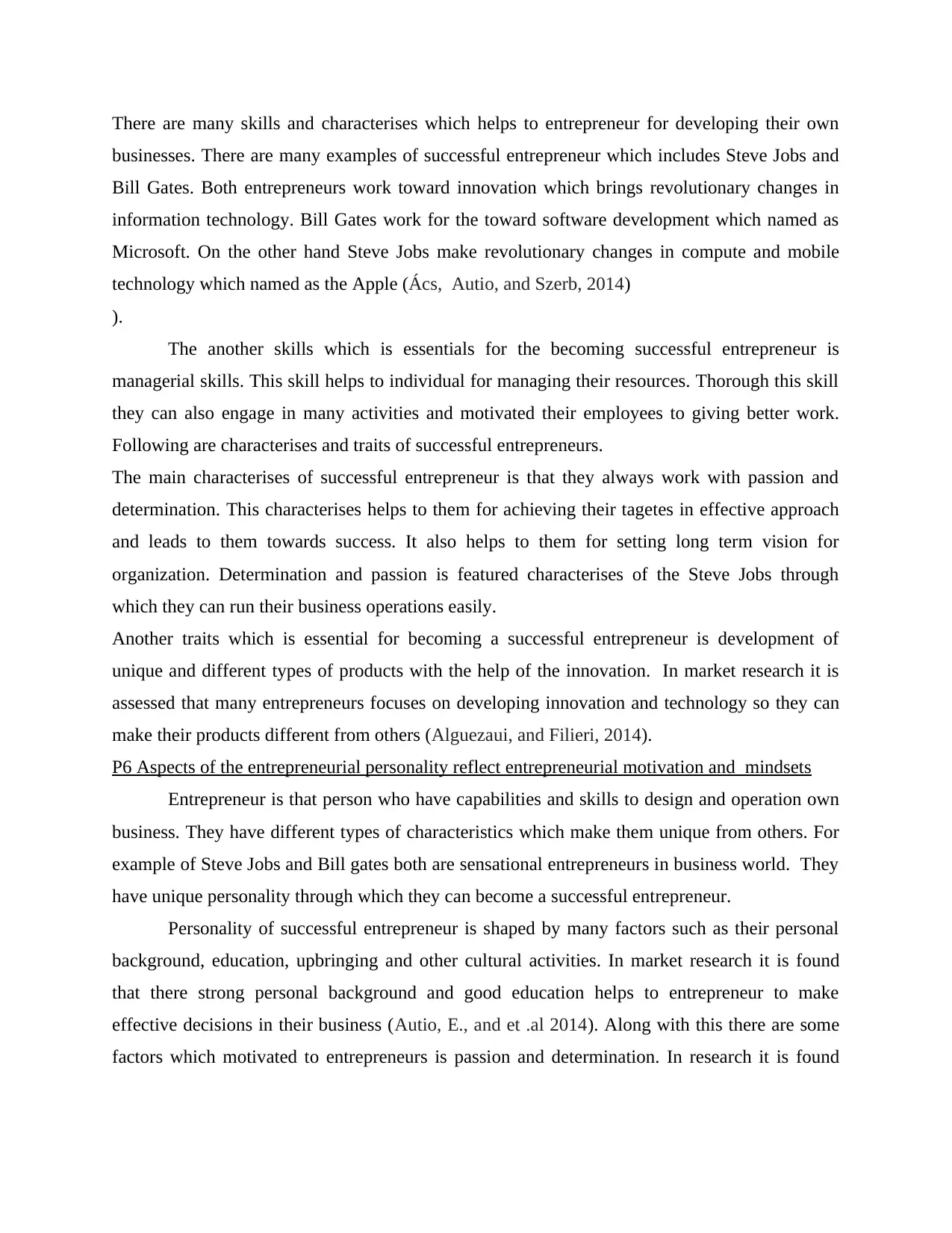
There are many skills and characterises which helps to entrepreneur for developing their own
businesses. There are many examples of successful entrepreneur which includes Steve Jobs and
Bill Gates. Both entrepreneurs work toward innovation which brings revolutionary changes in
information technology. Bill Gates work for the toward software development which named as
Microsoft. On the other hand Steve Jobs make revolutionary changes in compute and mobile
technology which named as the Apple (Ács, Autio, and Szerb, 2014)
).
The another skills which is essentials for the becoming successful entrepreneur is
managerial skills. This skill helps to individual for managing their resources. Thorough this skill
they can also engage in many activities and motivated their employees to giving better work.
Following are characterises and traits of successful entrepreneurs.
The main characterises of successful entrepreneur is that they always work with passion and
determination. This characterises helps to them for achieving their tagetes in effective approach
and leads to them towards success. It also helps to them for setting long term vision for
organization. Determination and passion is featured characterises of the Steve Jobs through
which they can run their business operations easily.
Another traits which is essential for becoming a successful entrepreneur is development of
unique and different types of products with the help of the innovation. In market research it is
assessed that many entrepreneurs focuses on developing innovation and technology so they can
make their products different from others (Alguezaui, and Filieri, 2014).
P6 Aspects of the entrepreneurial personality reflect entrepreneurial motivation and mindsets
Entrepreneur is that person who have capabilities and skills to design and operation own
business. They have different types of characteristics which make them unique from others. For
example of Steve Jobs and Bill gates both are sensational entrepreneurs in business world. They
have unique personality through which they can become a successful entrepreneur.
Personality of successful entrepreneur is shaped by many factors such as their personal
background, education, upbringing and other cultural activities. In market research it is found
that there strong personal background and good education helps to entrepreneur to make
effective decisions in their business (Autio, E., and et .al 2014). Along with this there are some
factors which motivated to entrepreneurs is passion and determination. In research it is found
businesses. There are many examples of successful entrepreneur which includes Steve Jobs and
Bill Gates. Both entrepreneurs work toward innovation which brings revolutionary changes in
information technology. Bill Gates work for the toward software development which named as
Microsoft. On the other hand Steve Jobs make revolutionary changes in compute and mobile
technology which named as the Apple (Ács, Autio, and Szerb, 2014)
).
The another skills which is essentials for the becoming successful entrepreneur is
managerial skills. This skill helps to individual for managing their resources. Thorough this skill
they can also engage in many activities and motivated their employees to giving better work.
Following are characterises and traits of successful entrepreneurs.
The main characterises of successful entrepreneur is that they always work with passion and
determination. This characterises helps to them for achieving their tagetes in effective approach
and leads to them towards success. It also helps to them for setting long term vision for
organization. Determination and passion is featured characterises of the Steve Jobs through
which they can run their business operations easily.
Another traits which is essential for becoming a successful entrepreneur is development of
unique and different types of products with the help of the innovation. In market research it is
assessed that many entrepreneurs focuses on developing innovation and technology so they can
make their products different from others (Alguezaui, and Filieri, 2014).
P6 Aspects of the entrepreneurial personality reflect entrepreneurial motivation and mindsets
Entrepreneur is that person who have capabilities and skills to design and operation own
business. They have different types of characteristics which make them unique from others. For
example of Steve Jobs and Bill gates both are sensational entrepreneurs in business world. They
have unique personality through which they can become a successful entrepreneur.
Personality of successful entrepreneur is shaped by many factors such as their personal
background, education, upbringing and other cultural activities. In market research it is found
that there strong personal background and good education helps to entrepreneur to make
effective decisions in their business (Autio, E., and et .al 2014). Along with this there are some
factors which motivated to entrepreneurs is passion and determination. In research it is found
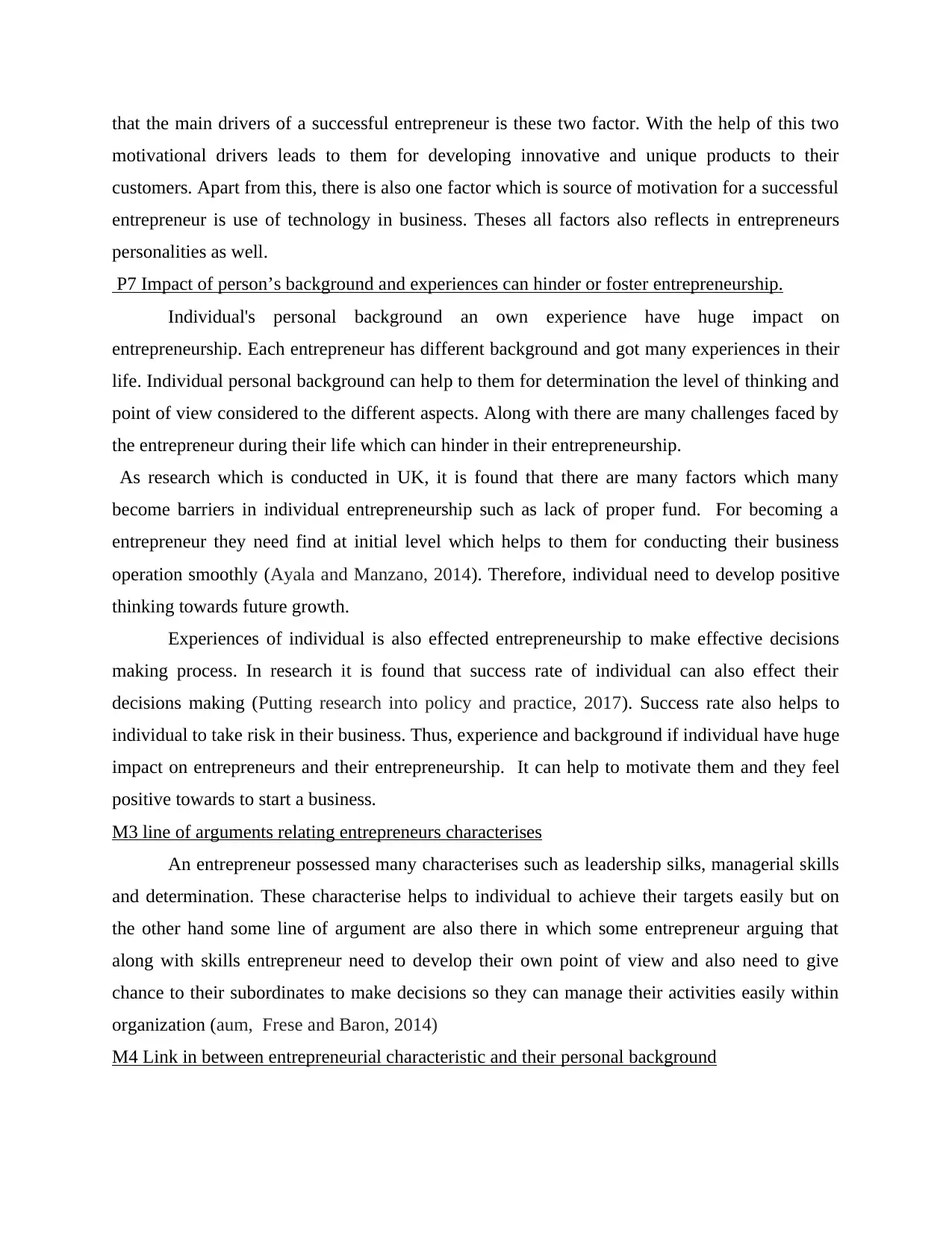
that the main drivers of a successful entrepreneur is these two factor. With the help of this two
motivational drivers leads to them for developing innovative and unique products to their
customers. Apart from this, there is also one factor which is source of motivation for a successful
entrepreneur is use of technology in business. Theses all factors also reflects in entrepreneurs
personalities as well.
P7 Impact of person’s background and experiences can hinder or foster entrepreneurship.
Individual's personal background an own experience have huge impact on
entrepreneurship. Each entrepreneur has different background and got many experiences in their
life. Individual personal background can help to them for determination the level of thinking and
point of view considered to the different aspects. Along with there are many challenges faced by
the entrepreneur during their life which can hinder in their entrepreneurship.
As research which is conducted in UK, it is found that there are many factors which many
become barriers in individual entrepreneurship such as lack of proper fund. For becoming a
entrepreneur they need find at initial level which helps to them for conducting their business
operation smoothly (Ayala and Manzano, 2014). Therefore, individual need to develop positive
thinking towards future growth.
Experiences of individual is also effected entrepreneurship to make effective decisions
making process. In research it is found that success rate of individual can also effect their
decisions making (Putting research into policy and practice, 2017). Success rate also helps to
individual to take risk in their business. Thus, experience and background if individual have huge
impact on entrepreneurs and their entrepreneurship. It can help to motivate them and they feel
positive towards to start a business.
M3 line of arguments relating entrepreneurs characterises
An entrepreneur possessed many characterises such as leadership silks, managerial skills
and determination. These characterise helps to individual to achieve their targets easily but on
the other hand some line of argument are also there in which some entrepreneur arguing that
along with skills entrepreneur need to develop their own point of view and also need to give
chance to their subordinates to make decisions so they can manage their activities easily within
organization (aum, Frese and Baron, 2014)
M4 Link in between entrepreneurial characteristic and their personal background
motivational drivers leads to them for developing innovative and unique products to their
customers. Apart from this, there is also one factor which is source of motivation for a successful
entrepreneur is use of technology in business. Theses all factors also reflects in entrepreneurs
personalities as well.
P7 Impact of person’s background and experiences can hinder or foster entrepreneurship.
Individual's personal background an own experience have huge impact on
entrepreneurship. Each entrepreneur has different background and got many experiences in their
life. Individual personal background can help to them for determination the level of thinking and
point of view considered to the different aspects. Along with there are many challenges faced by
the entrepreneur during their life which can hinder in their entrepreneurship.
As research which is conducted in UK, it is found that there are many factors which many
become barriers in individual entrepreneurship such as lack of proper fund. For becoming a
entrepreneur they need find at initial level which helps to them for conducting their business
operation smoothly (Ayala and Manzano, 2014). Therefore, individual need to develop positive
thinking towards future growth.
Experiences of individual is also effected entrepreneurship to make effective decisions
making process. In research it is found that success rate of individual can also effect their
decisions making (Putting research into policy and practice, 2017). Success rate also helps to
individual to take risk in their business. Thus, experience and background if individual have huge
impact on entrepreneurs and their entrepreneurship. It can help to motivate them and they feel
positive towards to start a business.
M3 line of arguments relating entrepreneurs characterises
An entrepreneur possessed many characterises such as leadership silks, managerial skills
and determination. These characterise helps to individual to achieve their targets easily but on
the other hand some line of argument are also there in which some entrepreneur arguing that
along with skills entrepreneur need to develop their own point of view and also need to give
chance to their subordinates to make decisions so they can manage their activities easily within
organization (aum, Frese and Baron, 2014)
M4 Link in between entrepreneurial characteristic and their personal background
Secure Best Marks with AI Grader
Need help grading? Try our AI Grader for instant feedback on your assignments.
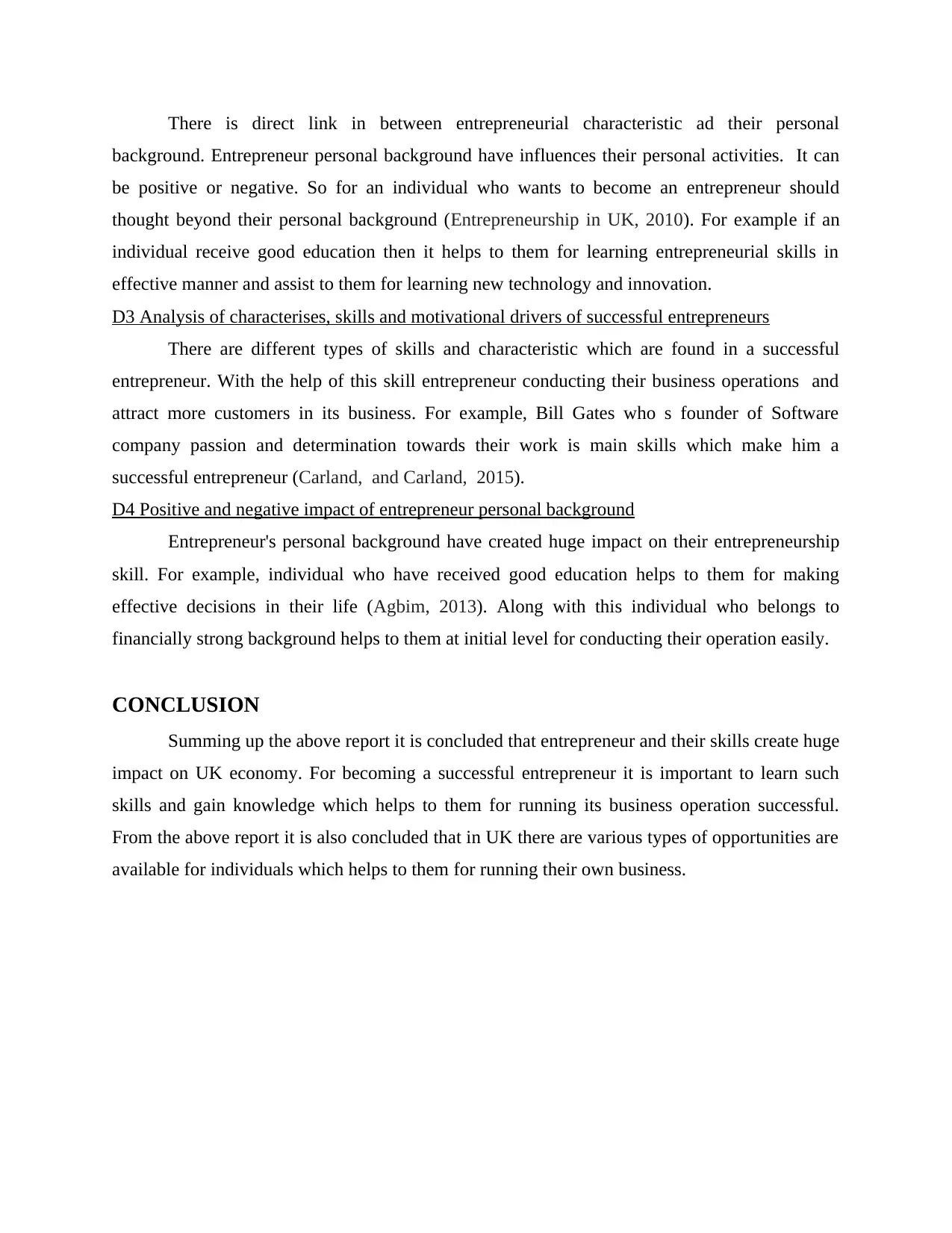
There is direct link in between entrepreneurial characteristic ad their personal
background. Entrepreneur personal background have influences their personal activities. It can
be positive or negative. So for an individual who wants to become an entrepreneur should
thought beyond their personal background (Entrepreneurship in UK, 2010). For example if an
individual receive good education then it helps to them for learning entrepreneurial skills in
effective manner and assist to them for learning new technology and innovation.
D3 Analysis of characterises, skills and motivational drivers of successful entrepreneurs
There are different types of skills and characteristic which are found in a successful
entrepreneur. With the help of this skill entrepreneur conducting their business operations and
attract more customers in its business. For example, Bill Gates who s founder of Software
company passion and determination towards their work is main skills which make him a
successful entrepreneur (Carland, and Carland, 2015).
D4 Positive and negative impact of entrepreneur personal background
Entrepreneur's personal background have created huge impact on their entrepreneurship
skill. For example, individual who have received good education helps to them for making
effective decisions in their life (Agbim, 2013). Along with this individual who belongs to
financially strong background helps to them at initial level for conducting their operation easily.
CONCLUSION
Summing up the above report it is concluded that entrepreneur and their skills create huge
impact on UK economy. For becoming a successful entrepreneur it is important to learn such
skills and gain knowledge which helps to them for running its business operation successful.
From the above report it is also concluded that in UK there are various types of opportunities are
available for individuals which helps to them for running their own business.
background. Entrepreneur personal background have influences their personal activities. It can
be positive or negative. So for an individual who wants to become an entrepreneur should
thought beyond their personal background (Entrepreneurship in UK, 2010). For example if an
individual receive good education then it helps to them for learning entrepreneurial skills in
effective manner and assist to them for learning new technology and innovation.
D3 Analysis of characterises, skills and motivational drivers of successful entrepreneurs
There are different types of skills and characteristic which are found in a successful
entrepreneur. With the help of this skill entrepreneur conducting their business operations and
attract more customers in its business. For example, Bill Gates who s founder of Software
company passion and determination towards their work is main skills which make him a
successful entrepreneur (Carland, and Carland, 2015).
D4 Positive and negative impact of entrepreneur personal background
Entrepreneur's personal background have created huge impact on their entrepreneurship
skill. For example, individual who have received good education helps to them for making
effective decisions in their life (Agbim, 2013). Along with this individual who belongs to
financially strong background helps to them at initial level for conducting their operation easily.
CONCLUSION
Summing up the above report it is concluded that entrepreneur and their skills create huge
impact on UK economy. For becoming a successful entrepreneur it is important to learn such
skills and gain knowledge which helps to them for running its business operation successful.
From the above report it is also concluded that in UK there are various types of opportunities are
available for individuals which helps to them for running their own business.
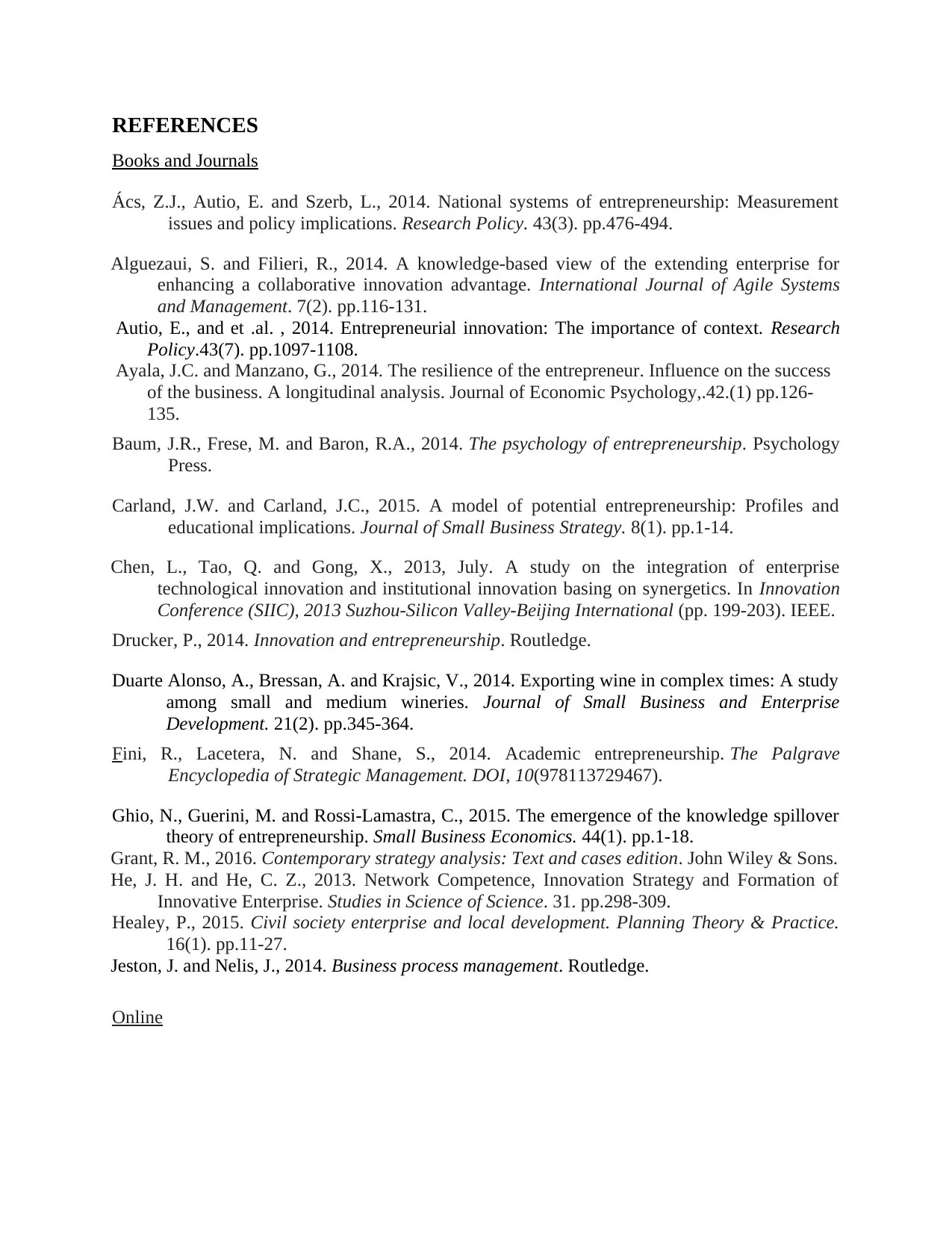
REFERENCES
Books and Journals
Ács, Z.J., Autio, E. and Szerb, L., 2014. National systems of entrepreneurship: Measurement
issues and policy implications. Research Policy. 43(3). pp.476-494.
Alguezaui, S. and Filieri, R., 2014. A knowledge-based view of the extending enterprise for
enhancing a collaborative innovation advantage. International Journal of Agile Systems
and Management. 7(2). pp.116-131.
Autio, E., and et .al. , 2014. Entrepreneurial innovation: The importance of context. Research
Policy.43(7). pp.1097-1108.
Ayala, J.C. and Manzano, G., 2014. The resilience of the entrepreneur. Influence on the success
of the business. A longitudinal analysis. Journal of Economic Psychology,.42.(1) pp.126-
135.
Baum, J.R., Frese, M. and Baron, R.A., 2014. The psychology of entrepreneurship. Psychology
Press.
Carland, J.W. and Carland, J.C., 2015. A model of potential entrepreneurship: Profiles and
educational implications. Journal of Small Business Strategy. 8(1). pp.1-14.
Chen, L., Tao, Q. and Gong, X., 2013, July. A study on the integration of enterprise
technological innovation and institutional innovation basing on synergetics. In Innovation
Conference (SIIC), 2013 Suzhou-Silicon Valley-Beijing International (pp. 199-203). IEEE.
Drucker, P., 2014. Innovation and entrepreneurship. Routledge.
Duarte Alonso, A., Bressan, A. and Krajsic, V., 2014. Exporting wine in complex times: A study
among small and medium wineries. Journal of Small Business and Enterprise
Development. 21(2). pp.345-364.
Fini, R., Lacetera, N. and Shane, S., 2014. Academic entrepreneurship. The Palgrave
Encyclopedia of Strategic Management. DOI, 10(978113729467).
Ghio, N., Guerini, M. and Rossi-Lamastra, C., 2015. The emergence of the knowledge spillover
theory of entrepreneurship. Small Business Economics. 44(1). pp.1-18.
Grant, R. M., 2016. Contemporary strategy analysis: Text and cases edition. John Wiley & Sons.
He, J. H. and He, C. Z., 2013. Network Competence, Innovation Strategy and Formation of
Innovative Enterprise. Studies in Science of Science. 31. pp.298-309.
Healey, P., 2015. Civil society enterprise and local development. Planning Theory & Practice.
16(1). pp.11-27.
Jeston, J. and Nelis, J., 2014. Business process management. Routledge.
Online
Books and Journals
Ács, Z.J., Autio, E. and Szerb, L., 2014. National systems of entrepreneurship: Measurement
issues and policy implications. Research Policy. 43(3). pp.476-494.
Alguezaui, S. and Filieri, R., 2014. A knowledge-based view of the extending enterprise for
enhancing a collaborative innovation advantage. International Journal of Agile Systems
and Management. 7(2). pp.116-131.
Autio, E., and et .al. , 2014. Entrepreneurial innovation: The importance of context. Research
Policy.43(7). pp.1097-1108.
Ayala, J.C. and Manzano, G., 2014. The resilience of the entrepreneur. Influence on the success
of the business. A longitudinal analysis. Journal of Economic Psychology,.42.(1) pp.126-
135.
Baum, J.R., Frese, M. and Baron, R.A., 2014. The psychology of entrepreneurship. Psychology
Press.
Carland, J.W. and Carland, J.C., 2015. A model of potential entrepreneurship: Profiles and
educational implications. Journal of Small Business Strategy. 8(1). pp.1-14.
Chen, L., Tao, Q. and Gong, X., 2013, July. A study on the integration of enterprise
technological innovation and institutional innovation basing on synergetics. In Innovation
Conference (SIIC), 2013 Suzhou-Silicon Valley-Beijing International (pp. 199-203). IEEE.
Drucker, P., 2014. Innovation and entrepreneurship. Routledge.
Duarte Alonso, A., Bressan, A. and Krajsic, V., 2014. Exporting wine in complex times: A study
among small and medium wineries. Journal of Small Business and Enterprise
Development. 21(2). pp.345-364.
Fini, R., Lacetera, N. and Shane, S., 2014. Academic entrepreneurship. The Palgrave
Encyclopedia of Strategic Management. DOI, 10(978113729467).
Ghio, N., Guerini, M. and Rossi-Lamastra, C., 2015. The emergence of the knowledge spillover
theory of entrepreneurship. Small Business Economics. 44(1). pp.1-18.
Grant, R. M., 2016. Contemporary strategy analysis: Text and cases edition. John Wiley & Sons.
He, J. H. and He, C. Z., 2013. Network Competence, Innovation Strategy and Formation of
Innovative Enterprise. Studies in Science of Science. 31. pp.298-309.
Healey, P., 2015. Civil society enterprise and local development. Planning Theory & Practice.
16(1). pp.11-27.
Jeston, J. and Nelis, J., 2014. Business process management. Routledge.
Online

Agbim, C. K., 2013. The Relative Contribution of Management Skills to Entrepreneurial
Success: A Survey of Small and Medium Enterprises (SMEs) in the Trade Sector. [Pdf].
Available through: <http://iosrjournals.org/iosr-jbm/papers/Vol7-issue1/B0710816.pdf>.
[Accessed on 14h April 2017].
Entrepreneurship in UK, 2010. Available through: <http://www.entrepreneursuk.net/>.
[Accessed on 14h April 2017].
Putting research into policy and practice, 2017. Available through: <sbe.org.uk/>. [Accessed on
14h April 2017].
Success: A Survey of Small and Medium Enterprises (SMEs) in the Trade Sector. [Pdf].
Available through: <http://iosrjournals.org/iosr-jbm/papers/Vol7-issue1/B0710816.pdf>.
[Accessed on 14h April 2017].
Entrepreneurship in UK, 2010. Available through: <http://www.entrepreneursuk.net/>.
[Accessed on 14h April 2017].
Putting research into policy and practice, 2017. Available through: <sbe.org.uk/>. [Accessed on
14h April 2017].
1 out of 13
Related Documents
Your All-in-One AI-Powered Toolkit for Academic Success.
+13062052269
info@desklib.com
Available 24*7 on WhatsApp / Email
![[object Object]](/_next/static/media/star-bottom.7253800d.svg)
Unlock your academic potential
© 2024 | Zucol Services PVT LTD | All rights reserved.




